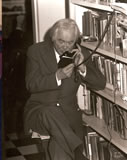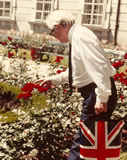Henry Steele Commager on Current Events
By Mary Commager - May 2007
Henry Steele Commager, who died in 1998, would have celebrated his 105th birthday on October 25 of this year. No longer a living presence, he still has much to tell us and is remembered by many---and missed---at a time when ordinary citizens and members of Congress, horrified by the events of September 11, 2001, and rightly so, seem more susceptible than at any other time in recent memory to believe that liberty must be restricted in order to protect the nation and broad powers must be granted to the Executive Branch in order to wage war against terrorism, and that the United States must wage that war even if left standing alone on the international stage.
Unable to lecture us in classrooms and public meeting places, to preach to presidents and congressmen in print, Commager's works remain and can still be read for those seeking understanding of our current situation, and reassurance as well.
If in the name of security or of loyalty we start hacking away at our freedoms - we will in the end forfeit security as well.
Freedom of speech and of the press---that is, freedom of inquiry, criticism, and dissent---are guaranteed in State and Federal Constitutions now over a century and a half old. It is a sobering fact, however, that each generation has to vindicate these freedoms anew, and for itself. Yet this is not wholly a misfortune; one might almost see in it Providential wisdom. For there are risks in taking things for granted, risks not only of failure to appreciate them but of failure to understand them. Freedoms vindicated anew are more precious than those achieved without effort, and only those required to justify freedom can fully understand it. ("The Pragmatic Necessity of Freedom," Civil Liberties Under Attack, 1951.)
Those words that he wrote in response to the McCarthy Era and the Cold War (and others, as we will see, he penned later during the protracted "unofficial" war in Vietnam) still resonate with reason and common sense; as does his unwavering defense of the First Amendment and Judicial Review and repeated warnings against being swept up blindly into the maelstrom of current events when Americans at another time had lost their confidence in freedom of speech and of the press and were willing to cede extraordinary authority to the Executive Branch. In the 1940s and 1950s he consistently and courageously challenged the policies of those conducting a war against international communism. Today we can apply many of the same challenges to those in charge of protecting us against international terrorism.

Henry Steele Commager
Aspen, CO
Of course, now, as then, there will be critics who dismiss his words and warnings as mere liberal democratic propaganda and decry his failure to conform to current standards of loyalty as unpatriotic.
Variously labeled, at times condemned, as not only liberal and unpatriotic, but also as socialist and communist and, even on one occasion, a "termite undermining the Constitution," Henry Commager was unwavering in his belief that by good fortune, a pragmatic attitude and a commitment to the ideals of the Enlightenment, our Founding Fathers had fashioned the most promising governmental system the world had ever seen. Perhaps he is best described as he himself admiringly portrayed the 19th century Unitarian preacher, Theodore Parker, whose biography he wrote in 1936: a moral agitator and an impressive example of the scholar in politics.
Writing a new introduction for the Parker biography in 1960, he acknowledged that such an accolade "now, when agitation of almost any kind is looked upon as bad manners and moral agitation as dangerous - is a dubious tribute." Nevertheless, Henry thought it a good thing, and a necessary thing, that a democratic republic, such as the United States, had its share of moral agitators and that its scholars were willing to take public stands. It can be said of Commager, as he wrote of Parker, that his long career "challenges those who think that scholars have no business in practical affairs and that scholarship is somehow tarnished if put to work."

Henry Steele Commager
While writing about history, reviewing books and commenting on the political scene from 1929 on, Commager's scholarship became increasingly public in the form of essays and articles (written frequently while crisscrossing the country to give lectures) after World War II and during the McCarthy years. Often, with the help of his son, Steele, a professor of classics at Columbia University, he would "coerce" those lectures into printed form and collect them together with newspaper and magazine articles, sometimes spreading over a decade, and then publish the collection as a book, thus reaching a wider audience.
In 1943, the slim volume, Majority Rule and Minority Rights, originally a lecture at the University of Virginia, Commager laid out one of the major themes that would dominate his scholarship and his public life. It is "the strength of democracy that dissent, where tolerated, is helpful rather than harmful." To protect what he saw as the uniquely American democracy which he so cherished, criticisms aside, and promoted (often to the irritation of assembled European students in his travels) Commager deemed it imperative that while "a democracy educates for continuous and active citizenship, whereas other forms of government educate only for passive obedience---and technical skills. The sine qua non of a successful democracy is that all citizens think for themselves about all issues that may arise."
After World War II, Commager became increasingly concerned with what he saw as a subversion of American freedom by those who claimed most vociferously to be its protectors. In 1954, one of the earliest collection of essays appeared, Freedom, Loyalty, Dissent. Written during the McCarthy Era, the most often reprinted of those articles which originally appeared in Harpers Magazine in 1947, is "Who is Loyal to America?"
It is easier to say what loyalty is not than what it is. It is not conformity. It is not passive acquiescence in the status quo. It is not preference for everything American over everything foreign. It is not an ostrich-like ignorance of other countries and other institutions. It is not the indulgence in ceremony---a flag salute, an oath of allegiance, a fervid verbal declaration. It is not a particular creed, a particular version of history, a particular body of economic practices, a particular philosophy.
It is a tradition, an ideal, and a principle. It is a willingness to subordinate every private advantage for the larger good. It is an appreciation of the rich and diverse contributions that can come from the most varied sources. It is allegiance to the traditions that have guided our greatest statesmen and inspired our most eloquent poets-the traditions of freedom, equality, democracy, tolerance, the tradition of the Higher Law, of experimentation, co-operation, and pluralism. It is a realization that America was born of revolt, flourished on dissent, become great through experimentation.
The Columbia history professor and World War II veteran was neither unaware nor unsympathetic to the fears of American political leaders and the American people who had seen the so-called "fall of China to the Reds" and the detonation of a nuclear device in the Soviet Union. But he had another fear and that was that in fighting totalitarian regimes the United States would become like them.
By 1966 when Commager had begun to see United States involvement in Vietnam as tragic and an event eroding faith in American democracy, he assembled another collection of essays. Over twenty years had passed since Majority Rule, Minority Rights. Yet these two works were bound together by the continued need to address, as he wrote in the introduction to Freedom and Order, "the over arching problem of the reconciliation of liberty and order in a world troubled, as ours is, by the eccentricities of both." Central to any reconciliation was the necessity for "freedom in our kind of society---freedom to inquire, criticize, and to dissent, freedom to travel, freedom from censorship, academic freedom---freedom as a method, probably the only method, of avoiding error and arriving at truth."
Two years later, in 1968, his readers welcomed the publication of the Commonwealth of Learning. This time the essays, spanning a decade from 1958-1968, centered on the education. The dominant note continued to be the protection and promoting of freedom. One of the earliest essays, written for The School Review in 1958, clearly echoes his words of 1943. Again Commager stressed the need for dissent and an informed, not just a passive, public and a need, too, to have schools that "at their best, are not a tranquilizer but a conscience for society." He reminded his readers of the need to protect the schools as a haven for unfettered intellectual discourse. In one piece, "Half Way to Nineteen Eighty-four," originally written for the Saturday Review in 1967, he warned against exploiting of schools and scholarship to the "dubious ends of ideological conflict." His concern was the "contest with Communism." We might well substitute the "War on Terrorism":
The reason we re trying to win the contest with Communism, and indeed with all forms of injustice and oppression, is that we believe in the virtue of freedom, of the open mind, of the unimpeded search for truth. These are not only our ultimate ends; they are, equally the indispensable means whereby we hope to achieve these ends. If we corrupt all of this at the very source, we may indeed win the immediate contest with "Communism" and lose the cause for which we are fighting.
His critics to the contrary, Henry Commager often wrote with pride, even a certain boastfulness, of the accomplishments of the United States in creating one country out of many colonies, of importing and modifying and making better the best of Europe's political and scientific achievements. [See for example his Empire of Reason (1977) with its thesis of "How Europe invented and America realized the Enlightenment.] This did not stop him, however, from being critical of certain official policies, of raising his voice in protest when he thought that America was on the brink of losing its way. By 1968, Commager had begun to fear that America had "succumbed in part" to the temptation of a chauvinistic nationalism, the same misguided nationalism that had resulted in two World Wars and confused patriotism with conformity.

Henry Steele Commager
As the involvement in Vietnam continued, Commager became increasingly concerned with the erosion he saw of the system of checks and balances within government which was another uniquely American characteristic and one of the country's greatest strengths. In reaction to that concern he published yet another collection of essays and lectures, The Defeat of America: Presidential Power and the National Character.(1974) The dramatic title aside, readers once again heard the same consistent themes and concerns---concern for governmental checks and balance, for the importance of judicial review, for the need for dissent and truth. Here, however, Henry concentrated on the inroads made against separation of power by the Executive Branch.
No enemy to a strong presidency and often, supporting the same, especially in the arena of domestic policy when the issue was the protection and extension of minority rights as when President Truman issued a 1948 Executive Order stipulating that there be an end to discrimination in federal employment, Commager came to see presidents beginning with John F Kennedy as abusing power. His special concern was the conduct of foreign relations and the ease with which presidents engaged the nation in war---overt or covert. He argued against executive orders as a means of bypassing Congress. His fear was that the United States, especially its executive branch had chosen a path of intervention rather than internationalism and such intervention undertaken unilaterally, he viewed as reckless. By then Commager had witnessed, and protested, the 1964 "Tonkin Gulf Resolution" which authorized President Johnson to "take all necessary measures to repel any armed attack against the forces of the United States and to prevent future aggression," the sending of American marines to the Dominican Republic without any token consultation with the Organization of American States---the hemispheric equivalent of the United Nations---and the escalation of the war in Vietnam. Alas, we can only imagine his passionate arguments against our precipitous rush to war in Iraq.
While expressing his concerns and his fears, Commager also offered hope to those who shared his preoccupations.
The defeat of America which this book recounts was primarily moral. Such a defeat may have---indeed it already has---a cathartic value. We may emerge from defeat stronger in our understanding of the Constitution and in our devotion to it; more ardent in our response to our obligations to be vigilant against usurpations of power; more intelligent in setting the limits on power, more magnanimous in the exercise of power and more mature in our grasp of what standards of morality become a great people -
Recently events appear to have vindicated his fears rather than his hopes. In 2002 nearly fifty percent of Americans, according to the First Amendment Center in Nashville, Tennessee, thought that our cherished guarantee of basic freedoms included in the Bill of Rights, especially freedom of the press, go too far. That same press, then in disrepute, was reporting that judicial review and access to legal representation was being suspended in the case of "enemy non-combatants," even those who were citizens of the United States. The that the Secretary of Defense and the new Homeland Security Secretary called for fewer restrictions on surveillance and the detention of citizens in order to protect America as a free society. Congress granted those wishes by passing the Patriot Act and furthermore appeared willing to abdicate its responsibilities concerning the power to make war by the authorization of the president to declare a pre-emptive, unilateral strike against Iraq. As the war in Iraq drags on, critics of the conduct of that war, those concerned with the rights of the detainees in Guantánamo, are once again being labeled as disloyal, even dangerous.
We cannot know with certitude Commager's reaction to recent events. No one can speak for him. Silent now is that voice that argued so passionately for a better America, an America that lived up to its potential as a democratic republic, as a haven for those fleeing oppression, as a land of opportunity and equality, a country of political and personal freedoms and a country committed to protecting those freedoms at home and abroad. Yet, we probably can safely assume that he would be warning us to avoid the temptation to sacrifice, for security's sake, any restriction of those freedoms.
Furthermore, given his abiding belief that the separation of powers was necessary to the American democratic system, we might almost hear him insisting that checks and balances, and the principle of judicial review be protected at all costs. We can imagine him chiding Congress that only the most foolish and pusillanimous amongst them would abdicate their right to authorize war. We can imagine, too, his harsh words for those that arrogantly pushed the United States towards war ignoring or belittling the very United Nations that we helped create as a stabilizing force amidst the chaos following World War II. Commager would have echoed his earlier warning to beware
Two pervasive and persistent assumptions [which] have conditioned if not dominated much of American foreign policy - the myth of American uniqueness and - second the assumption of the political, social and moral superiority of America
Towards the end of his scholarly and public career, before illness quieted his voice, concern with the global nature of America's problems increasingly captured Commager's attention. One of those he saw clearly was "violence and terrorism which defy reason as they defy control." In one of his last printed works in 1991, Commager on Tocqueville, Henry argued that if the United States was to
"maintain the moral and practical leadership which we exercised at the time of the Revolution and during part of the nineteenth century, and again in the crises of the first and second Wars, we should seek once again to establish, in all our acts, this time for the world, foundations of right and truth."
It was this passion for truth and the need to protect Americans' freedom to seek out that truth that dominated Commager's scholarship. It is this passion that we remember today as well as his insistence that the clinging to old assumptions of independence and self-sufficiency, the reckless substitution of interventionism for internationalism and the stifling of dissent can only lead to folly.
